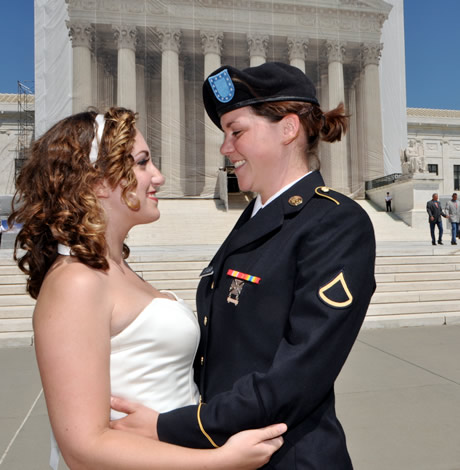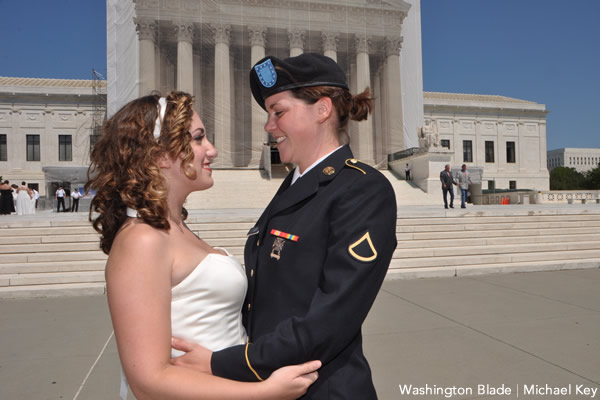Opinions
Supreme Court considers taking marriage cases
‘We are better people than what these laws represent’


(Washington Blade file photo by Michael Key)
The United States Supreme Court is scheduled to discuss seven petitions from five different states today urging the Court to decide the constitutionality of state laws excluding same-sex couples from marriage on a nationwide basis. The Supreme Court has complete discretion over whether or not to take a case. And no one knows if the Court will decide whether to take any of the cases at this time or defer its decision until a future conference this fall. Indeed, the Court will have a lot to cover at its first conference with 53 petitions in other cases on its schedule as well. However, we could learn possibly as early as Tuesday whether the Court will take up the issue of the freedom to marry nationwide this term, with a substantive, definitive decision likely in June 2015.
The momentum toward marriage equality in the courts has accelerated at breakneck speed in the just over a year since the Supreme Court’s landmark decision in United States v. Windsor invalidated Section 3 of the misnamed “Defense of Marriage Act,” a statute that prohibited the federal government from recognizing the marriages of same-sex couples validly performed in states with marriage equality. Since Windsor, 27 federal courts have found state bans to be unconstitutional, with only one lower federal court upholding such a ban. Significantly, all four federal appellate decisions, from which the seven petitions to the Supreme Court come, favor equality. Judges ruling for the freedom to marry include appointees of Presidents Carter, Reagan, G.H.W. Bush, Clinton, G.W. Bush and Obama. Federal District Judge Richard Young of Indiana described in his ruling the winning streak as a phenomenon “never” before “witnessed … throughout the federal court system ….” Similarly, 13 state courts have ruled in favor of marriage equality, with only one opposed.
The petitions before the Supreme Court arise out of federal appeals court decisions striking down five states’ marriage bans: Indiana (7th Circuit), Oklahoma (10th Circuit), Utah (10th Circuit), Virginia (4th Circuit), and Wisconsin (7th Circuit). All of the cases present the issue of whether or not a state may prohibit same-sex couples from marrying. However, the cases differ as well, and the justices likely will be considering these differences in determining which case or cases to take. Attorneys for same-sex couples in each of the cases have argued the particular circumstances of their individual cases make them desirable for review.
One difference in the cases is that the Oklahoma case raises only the issue of whether a state may ban same-sex couples from marrying under its state laws, while the other states’ cases also involve challenges to whether a state must recognize the marriages of same-sex couples validly married in other states. If the Supreme Court were to strike down state marriage bans nationwide, the Court would not need to decide if and when one state must recognize marriages performed in other states. Alternatively, if the Court declined to decide the issue nationwide or upheld state marriage bans, the issue of recognition of out of state marriages could be very important.
The various states’ laws at issue in the petitions also differ. For instance, Wisconsin permits same-sex couples to enter into domestic partnerships, affording them limited legal rights, while the other states with petitions before the Court do not. The wording of the marriage bans and the history of the political campaigns to pass them vary from state to state. Procedural histories of the cases differ as well. For instance, in Virginia, the Attorney General, representing the state defendant agrees that the ban is unconstitutional, and local county clerks are defending the state ban. In the other states, the state has uniformly defended the bans. The attorneys in each case differ, too, and include lawyers from groups who have been advocating for LGBT equality for decades, such as the National Center for Lesbian Rights, Lambda Legal, Gay and Lesbian Advocates and Defenders, and the ALCU.
The legal bases for striking down the bans also differ between the various federal appellate decisions before the Court. The appellate courts in the Oklahoma, Utah, and Virginia cases invalidated those state bans on the grounds that that they violated same-sex couples’ “fundamental right to marry,” while the appellate court in the Indiana and Wisconsin cases struck down those states’ bans on the grounds that laws that discriminate on the basis of sexual orientation are entitled to elevated scrutiny under the Constitution. Windsor held that DOMA violated the Constitution’s guarantees of both liberty and equality. Both issues, and very possibly whether the bans constitute unlawful sex discrimination, will doubtlessly be argued before the Court regardless of which case or cases it takes. However, the Justices may consider the logic or rationale of one or more of the appellate court decisions particularly useful for review.
Two additional federal appellate circuits will likely weigh in this fall as well. The Sixth Circuit heard cases arising out of marriage bans in Kentucky, Michigan, Ohio, and Tennessee in early August, and the Ninth Circuit heard cases from Idaho and Nevada in early September. From relevant circuit court precedent and the questions and comments the judges made at oral argument, most observers believe the Ninth Circuit will very likely rule in favor of equality, but the outcome of the Sixth Circuit cases is much harder to predict.
In remarks last week at the University of Minnesota, Justice Ruth Bader Ginsburg fueled speculation that the Court might wait to determine whether or not to take a case until the Sixth Circuit rules. She stated that there would be “no need for [the Supreme Court] to rush” if the Sixth Circuit ruled in favor of the freedom to marry, as all the other circuits who have addressed the issue since Windsor have. However, she said that a Sixth Circuit ruling against equality would create “some urgency” for the Court to step in. The Supreme Court often takes cases to resolve disputes among the circuits.
Further, the Supreme Court will take a case if four of the nine justices vote to hear it. The Supreme Court has stayed decisions in the Fourth, Seventh, and Tenth Circuits from taking effect until final resolution of the cases. If the Sixth and Ninth Circuits were also to rule in favor of equality, most observers believe it unlikely that the four justices who dissented in Windsor would simply let all the petitions be dismissed by voting to deny review — effectively permitting marriage equality in 20 additional states located in those circuits. But if the Supreme Court held the petitions until a circuit court ruled against the freedom to marry, many thousands of LGBT Americans could have to wait even longer for a decision. Regardless of how the Sixth Circuit rules, the issue of marriage equality is, in fact, “urgent,” for LGBT Americans, many of whom have been together for decades without legal recognition and protection.
Many of us would love to be a proverbial “fly on the wall” at the justices’ conference chamber, but we will of course have to wait until the Court makes public its decisions from the conference either later this week or on Oct. 6, the official beginning of the new term. Federal District Judge John E. Jones III, a George W. Bush appointee, wrote in his opinion, invalidating Pennsylvania’s marriage ban: “We are better people than what these laws represent, and it is time to discard them into the ash heap of history.” That time cannot come too soon.
John Lewis is legal and policy director for Marriage Equality USA.

There can be no other word than “insanity” for how the felon in the White House, along with his Nazi sympathizing co-president, are handling things. They are living in an alternative universe where they think they are a king and an emperor. They are happily screwing the American people, while creating havoc in the world. If the courts don’t stop them, and I am beginning to lose confidence in the Supreme Court, only Congress, if its members grow some cajónes, or the American people with their votes, will be able to eventually do it.
As I have written, Democrats will have to appeal to people at the local level district-by-district, to win. There have been discussions online about who the Democrats will put up in 2028. My view of those discussions are they are a waste of time. Debating whether it will be Booker or Buttigieg, and I am getting fundraising appeals from both, or someone else, is totally useless unless Democrats can win this year in New Jersey and Virginia, and then take back at least the House of Representatives in 2026. If Democrats can’t do that, it may not matter who our candidate is in 2028.
I recently went to a meeting to hear David Hogg, one of the new vice chairs of the DNC. He is a great young speaker. One suggestion I had for the DNC was they call out Sen. Bernie Sanders, an independent, when he suggests people can vote for a third party. There are very few districts in the nation where a third party has a chance in hell of winning. What they do, as we have seen over and over again, is to help Republicans.
Since Trump won, the list of those he is screwing keeps growing. Today it includes veterans, farmers, teachers, and students. He and his Cabinet have ended programs that helped protect African Americans, the LGBTQ community, women, Latinos, and poor people. He has stopped progress on cancer research, HIV/AIDS research, and fired people who help predict our weather. He fired, and then had to rehire, thousands of people fired by accident, and those the courts forced the administration to rehire.
Today in the United States we have a measles outbreak, with the first children in decades, dying from it. This because the man Trump has as his secretary of Health and Human Services speaks against vaccines. Now that a-hole is trying to have fluoride removed from our water, based on one study that says twice the amount we actually use, could cause problems. He recently did admit the MMR vaccine can actually prevent measles, and now suggests potentially using it.
Veterans are being fired from civilian jobs in the Pentagon, Veterans Administration, and other agencies. When asked about the firings, Alina Habba, a counselor to the president, had a dismissive response. “Without providing any evidence, Habba claimed that some who served in the U.S. military and went on to take government service jobs were not doing the work.” She wasn’t contradicted by anyone in the administration, or Congress. So, I would question why any veteran would ever again support Trump, or any of his acolytes.
As Trump moves forward with tariffs, we will see who gets screwed the worst. He paused them for 90 days because business leaders, who supported him, began to question his ideas. “Billionaire investor Bill Ackman, a rare critic among U.S. President Donald Trump’s top supporters, has voiced concerns over the president’s tariff strategy, and voiced, ‘this is not what we voted for.’”
Then came the first, if tepid, sign of some Republican senators taking their lips off Trump’s ass long enough to do their job. It was reported, “signs of GOP wariness emerged Thursday. Republican Sen. Chuck Grassley of Iowa teamed up with Democratic Sen. Maria Cantwell of Washington on a bill that would require the president to give 48 hours’ notice to Congress ahead of his imposition of tariffs, and those tariffs would expire after 60 days unless Congress approves them. The bill, called the Trade Review Act of 2025, was an amendment to a section of the Trade Act of 1974.” Then the bond market began collapsing and even Trump’s Treasury Secretary took notice.
Every day we wake up to another egregious thing the president has done, or wants to do. He sees himself as a dictator and is only interested in what he can do to wreak vengeance on anyone not willing to genuflect before him. My hope is people stop genuflecting, and instead, tell him to go f—k himself.
Peter Rosenstein is a longtime LGBTQ rights and Democratic Party activist.
Opinions
Fired. Depressed. Moved to Canada: Tales from Trump 2.0
We must not normalize what’s happening to our country

It’s been difficult to keep up with the news since Jan. 20, as the attacks on our community keep coming. The same president who nominated the highest-ranking openly gay government official ever (Scott Bessent as Treasury Secretary) is the same president who is killing transgender Americans via his incessantly cruel attacks on their humanity. (When you deny someone access to the bathroom, you deny their humanity.)
I have struggled to organize my thoughts about Trump 2.0. Instead, I am sharing anonymized anecdotes from people I know and love who have been adversely impacted by his cruelty. This is just a sampling of what Trump has wrought in barely three months.
• A close friend with a transgender child abruptly packed up and left the country, driving to Canada. I had no idea until a cryptic social media post prompted me to call. Their trans child no longer felt safe in our country. My friend sold the family home, packed the car, and drove to Canada. My heart breaks for their beautiful family, now geographically separated because of Trump’s attacks.
• Another friend in a high-ranking job was singled out by the MAGA social media mob. She was derided as a “DEI hire” simply because she’s a lesbian. The FBI came to her home and advised building a panic room. She now travels with armed security, something she never had to do before Trump.
• A friend was offered a job by a major news outlet. The offer was rescinded after their boss discovered a nearly 10-year-old blog post they wrote that was critical of Trump. Yes, the mainstream media are caving to Trump’s threats.
• Yet another friend in a senior civilian government post has been forced to fire longtime employees and remove any mention of the LGBTQ community (to which he belongs) from a government website. This includes important studies on LGBTQ health and wellness.
• And another friend who was fired from her federal government job is struggling with depression, unable so far to find a new job after a career in public service that ended with a dismissal for no reason.
Welcome to MAGA’s America, where public servants are ridiculed, threatened, and fired. Where mothers and fathers of transgender children are fleeing the country because their child fears being killed here. Where hard-working business leaders who happen to be LGBTQ or women or Black are targeted and doxed by Trump’s brainwashed, bigoted followers. Where one-time corporate “allies” are running like cowards from their DEI programming and support for the LGBTQ community.
At the Blade, I have fielded multiple requests from sources asking that their names be removed from past news articles because they fear government retaliation merely for being publicly identified as LGBTQ. We’ve never needed a formal policy for such requests until Trump returned to power. After consulting with experts in journalism ethics, we have decided to take such requests on a case-by-case basis. We have a unique contract with our readers, very different from mainstream outlets like the Washington Post, and will find a workable solution as these questions arise.
So now what? Those of us in a position to resist must do so. We must not normalize what’s happening to our country. Firebombing a governor’s residence; storming the U.S. Capitol; plotting to kidnap Democratic governors — none of this is normal or “OK,” as Pennsylvania Gov. Josh Shapiro said in a major understatement last weekend.
Join the growing protest movement around the country. Call and write to your elected representatives urging them to oppose Trump’s agenda, from his stupidly reckless tariff policies to his anti-trans attacks. Attend local town halls with elected officials and denounce the mass firings of federal workers. Read and donate to your local media outlets doing their best to cover all of these attacks on democracy.
And, perhaps most crucially, do what you can to support Democratic candidates running in the 2026 midterms. Our only hope of saving American democracy and the Constitution may be for Democrats to retake one or both houses of Congress next year. The Republicans have a narrow 220-213 majority. Last week, the Democratic Congressional Campaign Committee highlighted 35 GOP-held districts it is targeting in 2026; they only need to flip seven of those. The Senate will be a bigger challenge, though not impossible, as Democrats would need to flip four seats to take control. They have a good shot in Maine and North Carolina. With Trump’s plummeting approval ratings and an economy headed for recession, the Alaska and Ohio Senate races could also be competitive.
Stay engaged and informed. Reach out to friends who’ve lost their jobs to Elon Musk’s craven chainsaw approach to gutting the federal government. Do what you can to support and reassure the trans community that we have their backs. We know better than anyone that silence equals death. So find your voice and speak out.
Kevin Naff is editor of the Washington Blade. Reach him at [email protected].
Opinions
Keir Starmer has blood on his hands
British prime minister’s foreign assistance cuts will kill people with HIV

My name is Mijan. I’m a born and bred East Londoner, a child of immigrants, an ACT UP London/UK activist, and I live with HIV. ACT UP UK and our kin across the pond, ACT UP US, was founded to fight and champion rights of people living with and affected by HIV/AIDS. We are a global coalition that believes in Fund Healthcare Not Warfare, a transatlantic movement that demands global health justice and an end to military prioritisation over the health and wellbeing of human life. The threats we face are the same from funding cuts, state suppression, and queer erasure. U.S. or the U.K. we sing from the same hymn sheet: We will not stand by while our lives are at risk.
On April 8, eight of us ACT UP Activists disrupted Prime Minister Keir Starmer’s Liaison Committee. We were peaceful and determined to execute our die-in. Security was almost as determined to make sure we didn’t. They strong-armed us out of parliament like we were a threat. We tried to begin our die-in, to make a statement for the lives at stake, but instead we were rammed out the revolving doors as we were leaving, which they ended up jamming and dumped on the stairs of Portcullis House. We made the best of a bad situation and laid on the dirty grounds — because this is what democracy looks like in the U.K. when it’s under attack.
Why were we there? Because we are scared and angry. Because we are regressing. Because AIDS cuts means death.
Keir Starmer’s Labour government is enacting the most drastic reduction in U.K. AID cuts we have seen in many years, slashing it from 0.5 percent of gross national income to 0.3 percent by 2027. This is the lowest level of Official Development Assistance spending in years — and it’s being justified to increase defense spending. More missiles, fewer medicines. More tanks, fewer treatments.
Starmer, you justify this under the guise of “security” — but whose security are you protecting? It’s not mine. I live with HIV, and I’m only alive today because of global health funding, funding that made treatment, programs, and vital research possible. Thanks to that support, HIV is no longer a death sentence for many of us. But that’s not the case for everyone.
Not everyone has the privilege of being born in countries like the U.K., where treatment is accessible and free. Many will die because of funding cuts. Many will lose loved ones. We will see HIV contraction rates rise. We will see preventable deaths increase.
Kier, what you are doing is wrong! What you are doing is horrible! What you are doing is deadly!
Don’t take my word for it. Listen to our world health experts. The World Health Organization’s Director-General, Tedros Adhanom Ghebreyesus, has warned that these cuts could cause over 10 million additional HIV infections and three million HIV-related deaths. A new modeling study published in the Lancet HIV by the Burnet Institute backs this up — projecting a 24 percent reduction in international HIV funding by 2026 if current trends continue. Twenty years of progress in HIV treatment and prevention could be wiped out by a single budget.
Deplorable.
Is this what Labour stands for? I thought this party would fight for us.
HIV/AIDS disproportionately affects queer people and people of color — already marginalized communities who are now being discarded. Labour was created by and for people who lived on the fringe of society, the little guy. Labour is meant to empower, support and protect the vulnerable, not sacrifice them. Labour is meant to listen to the people, not silence them and ram them out like cattle to slaughter. Labour should be ashamed. You are not for the people.
We were there for a reason. We were there because lives depend on it. We showed up because diplomacy failed. When we chose peaceful protest, we were met with aggression and suppression. That’s what we need to talk about too. Because this isn’t just about foreign aid anymore — this is also about our right to protest being attacked.
When activists are forced out of parliament for daring to peacefully protest against inhumane policies, it truly puts into perspective a dying democracy.
Democracy is no longer open to the people. Our ability to protest is now treated as a threat to power. Our democracy is under threat. And it’s not just from Tory strongmen. It’s from the very party that’s supposed to be on our side.
This Labour government has abandoned its principles and has abused people’s trust. That it will turn its back on migrants, on the poor, on queer people, on disabled people, and now — on people living with and at risk of HIV/AIDS. It is morally bankrupt.
Bombing your way to justice will not achieve equality. Ignoring a global health crisis and is not progressive. Get your priorities straight: Fund health care, not warfare. Invest in life, not death. Restore the 0.5 percent foreign aid commitment, and stop treating the most vulnerable lives on the planet as expendable.
Keir Starmer, you have blood on your hands.
You may have pushed us out of parliament, but we will not be silenced. We will be louder. We will be bolder. We will not let this die. ACT UP has always believed in one simple truth: SILENCE = DEATH.
Mijan is a pseudonym for an HIV-positive activist who believes that SILENCE = DEATH.
-

 State Department4 days ago
State Department4 days agoHIV/AIDS activists protest at State Department, demand full PEPFAR funding restoration
-

 Brazil4 days ago
Brazil4 days agoUS lists transgender Brazilian congresswoman’s gender as ‘male’ on visa
-

 District of Columbia4 days ago
District of Columbia4 days agoCapital Pride wins $900,000 D.C. grant to support WorldPride
-

 Mexico3 days ago
Mexico3 days agoGay couple claims Puerto Vallarta wedding venue discriminated against them










